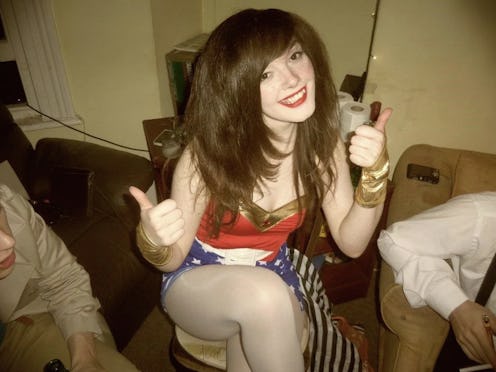Fashion
Losing My Lipstick Made Me Stop Self-Objectifying

As a teenager who lusted over lip glosses and blushed over balms, I was probably always destined to discover a love of red lipstick. But it wasn't until I was 20 and in my second year of college that I embraced the confidence-boost red lipstick could offer in all its striking, put-together, armor-like glory. I'd never been the biggest fan of my face, but 20 was when what fragmented self-identity I had managed to hold together came crashing down around me.
Confidence-crushing things just started happening, but it wasn't like a domino effect. It was more like someone had taken a chisel and started chipping away at my sense of self until they hit my soft, vulnerable underbelly. Second year brought with it an academic step-up I hadn't anticipated, and as my understanding of my college course weakened, my first serious long-term relationship also started to dissolve.
As the life I'd constructed slowly started to disintegrate around me, I found myself spending more and more time in front of the mirror — picking and painting every imperfection, desperately praying that if I successfully masked the flaws on my face, I could somehow plaster the cracks in my life, too. Inevitably, these attempts were futile — until the self-esteem chisel reached so close to my heart that I almost stopped leaving the house altogether.
Then, rising from the barren ashes of my life like a phoenix, came red lipstick.
It all started when I discovered that legendary unicorn of drugstore lipsticks: The one that lets you live your life touch-up and smudge-free. The way it detracted attention from the sleepless circles under my eyes and actually complemented my dark hair and translucent complexion made me feel reinvigorated — no longer able to slip unnoticed through the cracks. Its bright red lacquered boldness made my self-esteem feel somehow reinforced with titanium, ready to fight another day. I felt like I existed, and it was damn well going to stay that way.
However, the problem with relying on an extraneous cosmetic product as the sole key to your personal confidence is that in reinforcing your armor, you become simultaneously more vulnerable than you've ever been before. I started correlating my personal value directly and primarily with my appearance — believing I'd only garner care and respect from friends and colleagues if I remained in a continuously preened state. I started to view myself as a brand — a marketable commodity.
Venturing outside without my lipstick, on the other hand, made me feel like my Achilles' heel was exposed for all to see, as if any remaining essence of wit and personality would always be starkly overshadowed by bare, mundane lips on a pale, nondescript face. People would see through me in an instant — through to the confused, insecure little girl nursing an ugly duckling complex and a serious case of imposter syndrome.
And so I embarked on a mission to become my own best friend. I realized that when I spent time in the company of those I cared about, the last thing on my mind was their appearance. What caught my interest was how their lives were going, what we could share to laugh about, and how to pack the most endorphin-saturated experiences into the time we had together.
When I studied the faces of my favorite people, their beauty wasn't defined by masked eye bags or winged eyeliner, but by their familiar mannerisms, their hilarious anecdotes, and the unique connection that glued our friendship together. The beauty I saw came from their unmistakeable, irresistibly flawed humanity — something no cosmetic product could ever replicate. It was time to stop oppressing myself by enforcing regimental standards of beauty in impractical situations that hindered my sense of enjoyment, and start valuing myself by my fingerprint-unique flaws and quirks. So bit by bit, I started to wean myself off my lipstick addiction.
Of course, this isn't to say that everyone who loves red lipstick must be addicted, or that wearing it is always a sign of reinforced beauty standards. For me, however, wearing a colored pout became something of a psychological need. One unexpectedly anxiety-ridden day would be enough to push me into retreating back behind the mask.
By conditioning myself on the confident days to believe I could be "whole" enough without masking my vulnerabilities — both cosmetically and emotionally — I slowly felt strong enough to get through the tenser days without my red lipstick reinforcement. Then, finally, I realized that not only was red lipstick only one way of looking "like myself" and that I was still capable of feeling at home in my skin without it, but that it's also only one tiny, peripheral way of reinforcing my less confident side for the battles of the outside world.
Instead, the most effective reinforcement feels like faking my self-worth until I make it, by telling myself I can be a substantial enough soul without the lippie. And I am.
Want more body positivity? Check out the video below, and be sure to subscribe to Bustle’s YouTube page for more self love inspo!
Images: Raffy Marie Parker